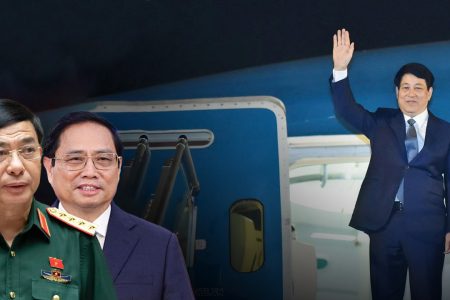
After the Philippines sent a note protesting the Coast Guard Law passed by the State Council of China on January 22, 2021, on February 16, China declared not to apply this law to the Philippines. The law would allow Chinese Coast Guard ships the right to open fire on foreign ships wandering in the waters that Beijing claimed.
The news was announced by the Philippine ambassador to China, Chito Sta Romania, during a press conference on February 16 in Manila. He said he was assured by the State Department spokesman and the Chinese Foreign Minister that the Chinese Coast Guards Law was not targeting the Philippines or any other country.
Chinese Foreign Ministry spokesman Hoa Xuan Oanh said on January 22 that China’s newly passed law is completely in line with international law.
In Vietnam on January 29, speaking regarding Chinese Coast Guards in the East Sea (South China Sea), Foreign Ministry Spokeswoman Le Thi Thu Hang told the press that „Vietnam requires the concerned countries to respect Vietnam’s rights, sovereignty rights and jurisdiction in the East Sea, goodwill to enforce international laws, UNCLOS, do not act, increase tensions and actively contribute to peace and stability in the East Sea.“
According to the South China Sea researcher, master of laws Hoang Viet, the promise of not using the Chinese Coast Guards Law with the Philippines has two near and far implications related to Vietnam that China wants to indirectly express:
“China is looking for a way to isolate Vietnam. Vietnam-China relations in recent years have been further separated from each other. Specifically, in October 2020, Chinese Foreign Minister Wang Yi visited 5 ASEAN countries but not Vietnam. In early 2021, Mr. Vuong Nghi went to four ASEAN countries, but not Vietnam again. Vietnam is the only ASEAN country that Mr. Vuong Nghi does not come.“
“The second implication is, can Chinese words be believed or not. The Chinese President promised to the US President that he would not militarize artificial islands in the Truong Sa (Spratlys), but in fact, it did. China rarely keeps its promises to many countries and even to Vietnam. So it is unclear whether the Philippines can believe in China’s promise of not applying the Law of the Coast Guard or not.”
Master Hoang Viet said Vietnam needs to present a stronger and more specific point of view instead of just saying it in general. With China’s new Law on Coast Guard, what should Vietnam do to protect fishermen is a question raised by Master Hoang Viet:
“Theoretically, Vietnam still says it is necessary to improve the Coast Guard’s capacity to counter the threats from China. In fact, China Coast Guard is a paramilitary force that is armed with more power than the navy of some other countries. Therefore, it is very difficult for Vietnam to use the Coast Guard force if China encroach on Vietnamese waters, suppressing Vietnamese fishermen as well as oil and gas exploration vessels in Vietnamese waters.“
Another South China Sea observer, journalist Do Thong Minh living in Japan, said that assuming China also makes a promise to Vietnam as it did with the Philippines, Vietnam should not be glad:
“In the past, many Vietnamese fishing vessels were shot (or sunk) by China. When China introduced its Coast Guard Law it was seen as formalizing a potential conflict. Philippines-China relationship is a delicate relationship, President Duterte has a difficult attitude towards the US but soft with China, the two sides have a fishing agreement around the Hoang Nhan (Scarborough).”
“But every word that is diplomatic is of temporary value. When the situation changes or when there are unexpected cases, there are unexpected things. What China says is what China says but nothing really guaranteed in the long term.“
According to sources from Kyodo News, Japan did not rule out the possibility of using weapons in the territorial waters around the Senkaku Islands after China’s Coast Guard Law came into effect on February 1, 2021.

Journalist Do Thong Minh confirmed that the head of the Japan Coast Guard Department announced on February 18 that he thought it could make Vietnam more confident in dealing with China’s Coast Guard:
“This archipelago in China called Diaoyu, in the south of Okinawa, is about 300km from the Fujian coast of China. Sometimes stressful but never in conflict. Recently, Japan announced that China has issued a shooting order, in contrast, Japan also has the right to open fire.”
“The story of Japan and Vietnam supporting each other in dealing with China. When Mr. Shinzo Abe took over as prime minister, he immediately went to Vietnam and promised to help Vietnam with the Coast Guard issue. Currently, most Vietnamese Coast Guard ships came from Japan. Some Vietnamese ships were from the US but the American canoes are smaller, and Japan gave Vietnam larger ships, both old and new.”
Vietnam can still sue China like the Philippines in a constant difficult situation posed by Beijing in Vietnamese territorial waters, said researcher Hoang Viet:
“In my opinion, as well as some experts, Vietnam can still use peaceful means, which is to bring the matter before an International Court, specifically, the International Court of Arbitration as the Philippines did in 2013 and was decided in 2016. In addition, if Vietnam takes this matter to the Court, then to see if the Court resolves that China Coast Guard has jurisdiction over Vietnam’s maritime area or not.”
Certainly, the International Court will settle the case as it has accepted the Philippines‘ case against China, Master Hoang Viet emphasized. Wherever it can be resolved, Vietnam will depend on its growing relationship with the US, Japan, Australia, etc. so that these countries can help put the Court’s ruling into practice.
Thoibao.de (Translated)


























